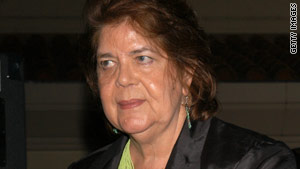Mankiller served 10 years as principal chief of the Cherokee, the second-largest U.S. tribe, and became its first freely elected leader in 1987. President Clinton awarded her the Medal of Freedom, the highest U.S. civilian honor, in 1998.
"Our personal and national hearts are heavy with sorrow and sadness with the passing this morning of Wilma Mankiller," said Chad Smith, her successor as chief of the Oklahoma-based tribe. "We feel overwhelmed and lost when we realize she has left us, but we should reflect on what legacy she leaves us. We are better people and a stronger tribal nation because of her example of Cherokee leadership, statesmanship, humility, grace, determination and decisiveness."
By Rob Capriccioso
Mankiller was best known for her leadership of her tribe, at which she served 12 years in elective office, the first two as deputy principal chief followed by 10 years as principal chief.
During her time in office and beyond, she was viewed nationwide as a strong Native American advocate, and had many friends in the women’s rights movement.
Mankiller retired from public office in 1995, but was never far from the public eye, serving as a board member on various organizations, including the Women Empowering Women for Indian Nations nonprofit. She also shared her wisdom at several learning institutions, including the University of Arizona.
Mankiller was a perfect example of a modern Native American. She wasn't a Plains chief, warrior, or princess. She didn't dress in feathers and leathers. She didn't look like Pocahontas or the Land O' Lakes maiden. Her career was a fitting rebuke to people who think of Indians only in stereotypical terms.
For more on the subject, see Wilma Mankiller's Inspirations and Native Women Advocates.


Is this the same one who sided with John "Corntassel" Smith against the inclusion of Cherokee freedmen in the Cherokee nation?
ReplyDeleteAre you talking about Cherokee Chief Chad Smith? I don't know any Cherokee named John Smith.
ReplyDeleteI gather Mankiller acted against the Freedmen when she was in office in 1984. But her views might have changed since then.
The Freedmen issue is complicated, of course. There's no clear right or wrong position, though I tend to favor the Freedmen's side.
For more on the subject, see:
http://www.worldproutassembly.org/archives/2008/02/the_cherokee_na.html
When Ross O. Swimmer dismissed the Freedmen from the citizenship rolls of the Cherokee Nation in 1983, illegally stripping them of their civil rights in the Nation, not a single Freedmen was consulted, even though a large number of Freedmen were enrolled citizens of the Cherokee Nation and had actually voted in the 1970 and 1975 elections.
Wilma Mankiller followed up to cement the ousting of Cherokee Freedmen when she and her council adopted legislation defining Cherokee Citizenship on having a Certificate of Degree in Indian Blood, thus legislatively booting the Freedmen from the tribe.
http://www.aaanativearts.com/cherokee/cherokee-freedmen.htm
http://tpmcafe.talkingpointsmemo.com/talk/blogs/s/o/socraticgadfly/2010/04/rip-wilma-mankiller----but-no.php
The unfortunate Freedmen decision does not detract from the fact that Chief Mankiller was a remarkable person. And, as you pointed, out a living rebuke to people who cannot get past the 'buckskins and feathers' image of Indians.
ReplyDelete